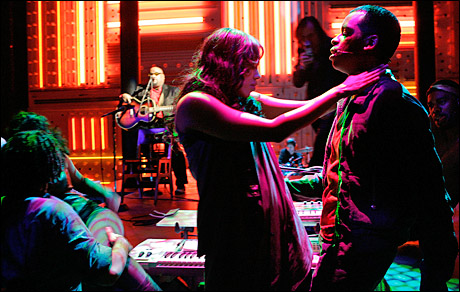 Even before Tuesday evening’s performance of Passing Strange began, the buzz in the house was unmistakable. You can take a show’s temperature by its audience; the cool thing about last night was the diversity, and by that I don’t mean simply the preponderance of blacks to whites. Suits were there, hobnobbing alongside folks old enough to have seen the original production of Tobacco Road; so was suburbia, as hopped up for a night out as that gaggle of students snatching tickets from the hands of their chaperone.
Even before Tuesday evening’s performance of Passing Strange began, the buzz in the house was unmistakable. You can take a show’s temperature by its audience; the cool thing about last night was the diversity, and by that I don’t mean simply the preponderance of blacks to whites. Suits were there, hobnobbing alongside folks old enough to have seen the original production of Tobacco Road; so was suburbia, as hopped up for a night out as that gaggle of students snatching tickets from the hands of their chaperone.
How to define Passing Strange? The simple explanation has to do with identity—blackness (in this case, one character’s rejecting, then co-opting the stereotype to get ahead) and our universal struggle for “realness,” or a self that’s immune to the boxes others would put us in. The more complex ideas—ageism, the costs of creativity, and the limits of familial love, to name a few—swirl in and out of moments comedic and dramatic, soothing and incendiary, topical and archaic. It’s a show that explores a condition we all experience, the consequences of which follow us our entire lives.
In short, it’s a show about something, which shouldn’t scare you away. You’ll hear some of the smartest music, see some clever staging carried out by a beautiful talented cast, all presided over by His Eminence, the incomparable Stew, whose beguiles so thoroughly that by evening’s end you’ll be praying to a new God. See Passing Strange and feel something shift inside.
